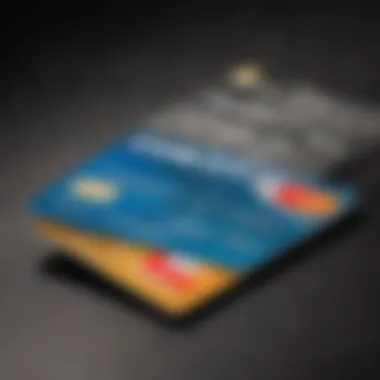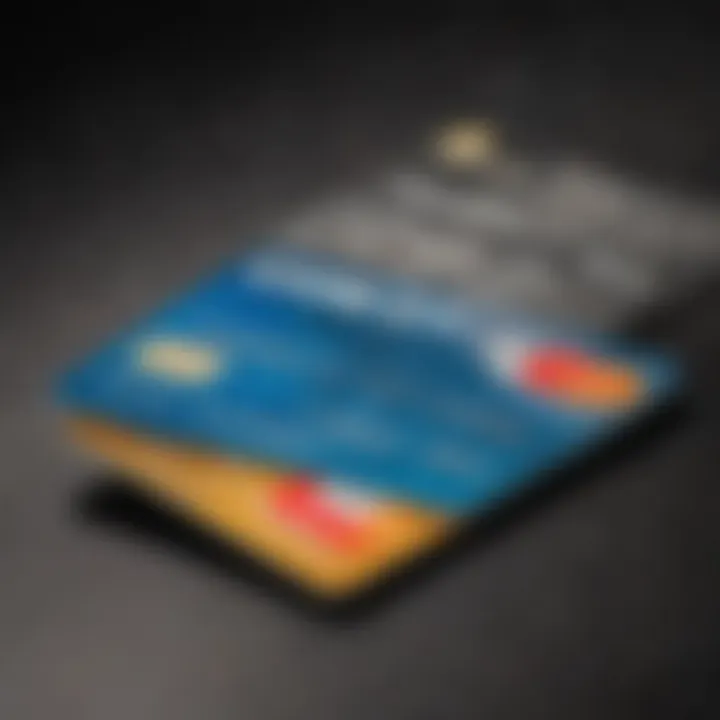Using Credit Cards for Monthly Mortgage Payments


Intro
Navigating the landscape of mortgage payments can feel like wandering through a maze, especially with the rise of unconventional solutions like using credit cards to manage monthly obligations. Many homeowners, drawn by the allure of rewards points or the convenience of easier payment methods, find themselves in this intriguing scenario. However, it’s important to peel back the layers and understand the broader implications of such a choice before swiping your card.
This article delves into several crucial aspects of utilizing credit cards to tackle your mortgage payments. From the nitty-gritty of understanding your credit status, to strategies that can strengthen your financial position, we aim to shine a light on what you need to know. Additionally, we’ll explore actionable insights that help you manage your overall financial health, enabling you to make well-informed decisions.
By the end, you'll not only grasp the potential advantages and pitfalls of this practice but also how it seamlessly fits into your comprehensive financial strategy.
Understanding Credit Status
Getting a grip on your credit status is essential if you're considering using credit cards for mortgage payments. Let’s dive deeper into what credit status means, how it’s calculated, and why it matters.
What is Credit Status?
In simple terms, your credit status reflects how lenders view your creditworthiness. It involves key metrics derived from various factors in your credit history. This overall snapshot helps lenders determine whether or not they feel comfortable giving you credit, whether it’s through loans or credit cards.
Key Factors Affecting Credit Scores
When discussing credit scores, it's a mix of several influencing elements. These include:
- Payment History: The consistency of your payments weighs heavily in your score.
- Credit Utilization Rate: How much credit you're using relative to your overall credit limit.
- Length of Credit History: Longer credit histories can help in improving score.
- Types of Credit Accounts: A mix of credit cards, mortgages, and other loans can be beneficial.
- Recent Credit Inquiries: Too many hard inquiries can raise red flags for lenders.
Understanding these factors is vital. They dictate not only the score in itself but also the rates you may qualify for.
Importance of Knowing Your Credit Reports
Credit reports hold the key to understanding your credit journey. They track your financial behavior and summarize your credit history. Regularly checking these reports ensures that you are aware of your standing. A slip-up, like an overdue payment that slipped your mind, can drastically affect your score.
How to Obtain Your Credit Reports
Accessing your credit report is fairly straightforward. You can request a free report annually from the major credit bureaus—Equifax, Experian, and TransUnion. All you need to do is visit AnnualCreditReport.com, which is the official site authorized by federal law. Keeping a close eye on your report enables you to spot inaccuracies or fraudulent activities.
Strategies to Improve Credit Score
Improving your credit score might seem daunting, but there are effective methods that can help you boost it over time.
Effective Methods for Boosting Credit
Consider adopting the following techniques:
- Pay bills on time: Establish reminders or automate payments.
- Lower your credit utilization: Aim to keep this below 30% of your total credit limit.
- Diversify your credit types: Using different types of credit can enhance your profile.
Managing Existing Debt
Don't just let debts loom over you. Prioritize paying down high-interest debts first. Consider using the snowball method—focus on the smallest debt first while making minimum payments on larger debts.
Importance of Timely Payments
Timeliness in payments can’t be stressed enough. A single late payment can take a toll on your credit score, making it harder to secure favorable rates for the future.
Utilizing Credit Responsibly
Maintaining a responsible attitude toward credit is paramount. Avoid overextending yourself; just because you can borrow a certain amount doesn’t mean you should.
Personalized Recommendations for Credit Products
With various credit products on the market, seeking the right ones tailored for your situation can be a game changer.
Assessing Your Financial Needs
Before diving into credit options, take stock of your financial health. Identify what you need from your credit card and evaluate your spending habits.
How Recommendations Work
Many services analyze your current financial situation and recommend suitable products. These could range from cards with lower interest rates to those offering rewards that align with your spending.
Best Credit Cards for Building Credit
When making decisions about credit products, consider these options known for helping in building credit:
- Discover it Secured Card
- Capital One Platinum Credit Card
- Amex EveryDay Card
Ideal Loans for Bad Credit
If you're dealing with an imperfect credit score, look into specialized lenders that cater to high-risk borrowers, such as:
- Upstart
- OneMain Financial
- Avant
Tax Preparation and Filing Tips
Handling finances often ties closely with tax responsibilities. Here are some tips to ease your tax preparation process.
Key Tax Terms Every Individual Should Know
Familiarize yourself with basic tax terminology, such as:
- Gross Income: Total income before any deductions.
- Tax Bracket: The rate at which your income will be taxed.
Deductions and Credits for Maximizing Refunds
Keeping records of expenses can help you find relevant deductions that could maximize your tax refund. Common items include business expenses and mortgage interest.
Importance of Organizing Financial Documents
When tax season rolls around, being organized is half the battle. Keep documents like W-2s, 1099s, and receipts compiled in one place, which will save time when it comes to filing.


Mistakes to Avoid During Tax Filing
Avoid common pitfalls by double-checking calculations, ensuring accurate Social Security numbers, and verifying your filing status to avoid unnecessary complications.
Actionable Insights and Next Steps
After understanding these components, the next step is to develop a concrete strategy focused on improving your financial trajectory.
Creating a Personalized Financial Plan
Draft a detailed financial plan that takes into account your short and long-term goals. Include aspects like savings, investment strategies, and a plan for paying down debts efficiently.
Resources for Continuous Learning
Financial literacy is a journey, not a destination. Utilize online platforms such as Reddit’s personal finance communities or financial podcasts for continued learning.
Importance of Monitoring Your Credit Status Regularly
Regular checks allow for timely fixing of issues and provide an understanding of how various actions affect your credit standing.
How to Track Progress and Set Goals
Establishing clear financial goals will help you visualize your success journey. Use spreadsheets or budgeting apps to make tracking progress easier.
Keeping your head in the game with these strategies will not only aid in making informed mortgage payment decisions but also set the stage for better financial health overall.
Understanding the ins and outs of mortgage payments with credit cards reveals potential benefits but also significant risks. Take the time to educate yourself, plan effectively, and you’ll be in a much better position to manage your finances.
Foreword to Mortgage Payments and Credit Cards
When it comes to financial management, understanding how to effectively manage mortgage payments is fundamental. Many homeowners find themselves exploring various options to ease their financial burdens, one of which involves the potential use of credit cards to pay monthly mortgage obligations. In today’s rapidly changing financial landscape, this topic deserves a closer look.
Why Consider Credit Cards for Mortgage Payments?
Using credit cards for mortgage payments can seem like a gamble, but it can also present unique advantages. For some, leveraging their credit card for these significant monthly payments might provide breathing room when cash flow is tight. This method may allow them to make use of rewards programs, which can yield bonuses or cash back on purchases, including large ones like mortgage payments. However, there are more angles to consider before jumping headfirst into this practice.
Key Elements of the Discussion
Here are some important aspects that will be tackled in this article:
- Legality: Is this practice legal? It's essential to sift through the regulations surrounding mortgage payments and credit card usage.
- Financial Implications: What impact does using a credit card have on monthly payments, loan servicers’ policies, and overall personal finance?
- Pros and Cons: Identifying the advantages versus potential pitfalls is crucial for informed decision-making.
- Strategies and Alternatives: Are there better or safer ways to manage mortgage payments?
"Understanding the holistic picture of personal finance, particularly when it comes to such significant commitments like mortgages, is pivotal for long-term financial well-being."
In this exploration, we aim to equip readers—be it credit management learners, financial health improvers, or loan applicants—with a comprehensive understanding of how credit cards can interplay with mortgage payments. By examining this intersection closely, we can reveal not just the benefits, but also the potential risks. Thus, one can make well-informed, practical choices for their financial futures.
The Basics of Paying Mortgages
Understanding the pure nuts and bolts of mortgage payments is like having a compass in the vast forest of personal finance. It helps you navigate the intricacies of one of the largest financial commitments many people will ever make. Getting to grips with how mortgages work lays the groundwork for any alternative payment methods, including the more unconventional route of using credit cards to fulfill these payments.
Mortgages are typically paid monthly, which means keeping a steady eye on the cash flow is crucial. This lays a solid foundation for stability in financial planning. Knowing the components of a mortgage payment allows individuals to target their financial habits and goals more effectively.
Traditional Payment Methods
Traditional methods of paying a mortgage have been quite straightforward. Most people opt for one main method: automatic bank transfers. This requires setting up a recurring payment system through their bank that directly debits the mortgage payment amount on a predetermined schedule. This approach has become the go-to for many due to its simplicity.
Pros of traditional payment methods include:
- Predictability: Automated transfers mean you know exactly when funds are leaving your account, reducing the chance of late payments.
- Convenience: After the initial setup, it requires minimal effort to maintain.
- Directness: Money goes directly to the mortgage company, avoiding detours that could complicate the process.
However, some might find themselves in a tight situation if the funds are low at the time of the transfer, facing extra fees or penalties that could put a strain on their finances.
The Process of Mortgage Payments
Now, let’s peel back the layers on the actual process of mortgage payments. A mortgage payment typically consists of a few key elements:
- Principal: The actual amount borrowed.
- Interest: The fee charged by the lender for borrowing the money.
- Escrow: This can include property taxes and insurance, which some lenders collect as part of the monthly payment.
"Understanding these components can empower you to make informed decisions that effectively manage your financial health."
The payment process itself can usually be initiated either through an online portal or paper checks. Online portals often streamline the process, offering features like payment history, upcoming due dates, and even tools for budgeting.
Having a reliable approach to mortgage payments can ease the stress associated with homeownership and financial management. It creates a roadmap, allowing individuals to map out their long-term strategy effectively, including those instances where credit cards might come into play for flexibility or benefits.
Legality of Using Credit Cards for Mortgage Payments
The intersection of credit card use and mortgage payments raises a host of legal questions that require careful consideration. Understanding the legal background surrounding this practice is essential for homeowners and potential buyers alike. It’s more than just ensuring compliance; it's about grasping the risks and benefits that accompany the use of credit cards in such a significant financial commitment. By delving into the legality, one can make informed choices that affect both financial health and peace of mind.
Understanding Legal Limitations
When it comes to using credit cards for making mortgage payments, several legal nuances come into play. First off, it’s crucial to recognize that not all lenders allow this method of payment. Some mortgage servicers have strict policies preventing homeowners from using credit cards, primarily due to the risk of chargebacks. This is when a credit transaction is reversed, which can create a complex legal snarl for both the lender and the homeowner.
It’s worth mentioning the various state regulations that may affect mortgage payment practices. For instance, while credit card transactions are generally permissible, some states impose restrictions on the type of financial transactions that can be processed via credit cards. This means that understanding local laws can be just as important as knowing the policies of your specific lender.
Moreover, one must consider the legal implications of using a credit card to pay off a mortgage. For example, while charges may be made to pay the mortgage, if a homeowner is using a rewards credit card to gain points or cashback, they must be aware of their current debt obligations. If this results in increased debt due to high-interest rates on credit card balances, it could lead to other legal troubles such as bankruptcy or foreclosure.
Loan Servicer Policies
Loan servicer policies toward credit card payments vary widely based on individual company regulations and the nature of the mortgage itself. Some lenders, as mentioned earlier, are quite resistant to accepting credit cards due to risk management strategies aimed at avoiding potential fraud or insolvency issues. You may encounter terms in mortgage agreements that explicitly prohibit this kind of payment, which is something worth seraching in your contract.
On the flip side, there are lenders who may offer flexibility, particularly those working with digital payment systems that could adapt to such transactions. Some firms have started to embrace digital payment processing technologies that enable credit card payments, albeit often at a cost. In some cases, there could be additional fees for using a credit card that may outweigh any rewards gained.
Furthermore, it is prudent to evaluate each lender's policy regarding transaction limits and fees associated with credit card payments. For instance, certain companies may allow credit card payments but impose a cap on the amount that can be paid in this manner each month.
- Remember:
- Always check your loan agreement
- Verify the servicer's policy
- Look out for potential transaction fees


In summary, while there might be room for maneuvering in the space of using credit cards for mortgage payments, it is imperative to remain informed about legal limitations and loan servicer policies. Taking the time to navigate these waters can save a homeowner from potential pitfalls in an increasingly complex financial landscape.
Advantages of Using Credit Cards for Mortgage Payments
The concept of using credit cards to pay monthly mortgage obligations can seem a bit far-fetched to some. However, there are tangible advantages that merit attention. By leveraging credit cards, homeowners not only stay on top of their mortgage payments but can also reap benefits that traditional payment methods might not provide. This section will elucidate the key advantages associated with such a payment approach, paying close attention to the specific elements that contribute to enhanced financial management.
Rewards Programs and Cash Back
Many credit cards come equipped with rewards programs that offer points, miles, or cash back on purchases. While these rewards typically apply to day-to-day expenditures, savvy homeowners can capitalize on them by directing their mortgage payments through their cards.
This means that each mortgage payment—being a significant sum—could potentially earn points towards future travel or cash back that can be put towards other expenses. Here are a few things to consider:
- Maximizing rewards: By orienting regular monthly payments into a rewards structure, it becomes easier to accumulate benefits quickly. For example, if your mortgage payment is $2,000 and your card offers 1.5% cash back, that translates to $30 back every month—money that can go towards groceries or even an emergency fund.
- Transferable rewards: Certain credit cards extend flexibility, allowing you to transfer points to airline frequent flyer programs or hotel loyalty schemes. This opens up avenues for securing travel arrangements or experiences that conventional saving methods might not achieve.
However, it's crucial to take note of the fine print. Not all rewards cards permit payment transaction classification under mortgage payments. Always dig into the details to ensure that you’re not missing out on potential rewards simply due to restrictions that may apply.
Improved Cash Flow Management
Navigating the waters of personal finance involves ensuring liquidity, especially when it comes to managing a mortgage. Using credit cards for mortgage payments can help improve cash flow management for various reasons:
- Flexible payment options: Credit cards generally offer a grace period before interest accrues. This can afford homeowners a little leeway, allowing them to manage their cash more effectively. For someone in a tight spot, this flexibility can provide just enough room to meet other pressing financial obligations, such as medical bills or tuition.
- Easier tracking: Credit cards provide detailed monthly statements, making it simpler to track expenses. This can help homeowners analyze their financial habits, and by extension, assists in budget management. Analyzing spending patterns gives a better perspective on where cuts might be needed.
- Emergency reserve: In unforeseen circumstances, like a job loss or sudden medical expense, using a credit card can sometimes serve as a temporary buffer. Homeowners can prioritize immediate needs while planning out how to settle their credit balances over time.
While these advantages may paint an appealing picture for using credit cards to handle mortgage payments, it’s essential to weigh the potential costs against the benefits.
Taking the plunge into alternative payment methods can lead to more flexible cash flow and potentially rewarding gains if approached thoughtfully and with due diligence.
"Using credit cards for mortgage payments can transform how you view financial responsibility, opening doors to rewards and an improved cash flow strategy."
In a world of fluctuating economic conditions, homeowners must stay informed and vigilant, ensuring they make choices that truly serve their financial health.
Potential Downsides of Paying Mortgages with Credit Cards
When it comes to using credit cards to pay monthly mortgage payments, there are numerous pitfalls that deserve a thorough examination. While this method can appear alluring due to its flexibility and potential for rewards, it's crucial to understand the inherent complexities that come with it. For many, making your mortgage payment with a credit card is a double-edged sword that commands a deeper look into costs and implications that are not universally acknowledged.
Interest Rates and Fees
One of the weightiest factors in considering credit card payments for mortgages is the often sky-high interest rates. Mortgage loans typically have interest rates that are much lower than credit cards. Let's say you’re sitting on a credit card with a 20% interest rate; that’s a hard pill to swallow when you could have locked in a much better rate for your mortgage.
Fee structures can similarly raise the stakes. Most mortgage servicers won’t directly accept credit card payments, which means you often have to rely on a third-party service. These services might charge substantial fees, ranging from 2% to 5% of your payment.
- Monthly Fees: Even if you’re using a card with generous rewards, those monthly fees can more than offset any cash back or points you might earn.
- Transaction Fees: For frequent users, these fees can accumulate faster than a snowball rolling downhill, resulting in a hefty cost that impacts your financial situation.
- Variable Rates: If you're using a credit card with a variable interest rate, you might find yourself in a tighter spot if interest rates go up.
Ultimately, the penchant for quick cash or perceived convenience could lead to a precarious financial squeeze. Understanding these factors fully is vital to avoid being cornered by exorbitant fees and interest.
Impact on Credit Scores
The other critical area to be mindful of is how using credit cards for mortgage payments can meddle with your credit score. Your credit score is fundamentally a measure of your credit risk to lenders, and using too much of your available credit can lead to a reduction in your score, making you less attractive to future lenders.
- Credit Utilization Ratio: This is a significant piece of the credit score puzzle. Credit bureaus look at how much of your available credit you are using. If you are charging your entire mortgage payment, this can easily elevate your utilization ratio above 30%. That’s not just a red flag; it’s a bullhorn signifying to lenders that you might be overextending.
- Payment History: If by chance you miss a payment or make it late because you’re managing multiple credit lines, you not only rack up late fees but also negatively affect your payment history, which is another critical component of your score.
- New Credit Accounts: Opening new credit cards or accounts for the sake of handling mortgage payments can further impact your score—each new inquiry counts against you, potentially leading to an even lower score.
In summary, while there are potential benefits to using credit cards in this way, it comes with its fair heap of consequences. Balancing the pros and cons is essential; if you find yourself too often navigating between convenience and caution, the results could sting you down the line.
Mechanics of Paying the Mortgage with Credit Cards
Understanding the mechanics involved in paying a mortgage with credit cards is crucial for both practicality and strategic financial planning. This method involves more than just transferring one debt to another; it requires a nuanced understanding of how payments are processed, the associated fees, and the long-term impact on financial health. With the rising popularity of flexible payment options, knowing the mechanics behind this practice can help individuals make informed decisions that could either ease or complicate their financial journey.
When considering using credit cards for a mortgage payment, it is essential to grasp the specific steps involved and the options available. Not all credit cards or lenders will allow this practice, and terms vary from one institution to another. Moreover, the potential benefits, such as earning rewards or managing cash flow, must be carefully balanced against the risks that come with interest rates and fees.
Steps to Set Up Payments
Setting up mortgage payments through a credit card involves several specific steps:
- Check Loan Servicer Policies: The first step is to confirm whether your loan servicer permits credit card payments. Some servicers might have strict policies against this payment method due to potential complications in processing or the risk of higher fees.
- Choose the Right Credit Card: Not all credit cards are created equal. Aim for one that offers rewards or cash back on transactions, ensuring that your mortgage payment can contribute positively to your financial profile.
- Set Up Third-Party Payment Services: Many people use third-party services that facilitate credit card payments for mortgages. Research reputable companies and understand their fees and processes before committing.
- Ensure Timeliness: Establish reminders to make sure your payment is processed on time. Credit cards usually have different processing times compared to regular bank transactions.
- Monitor Statements: Keep an eye on your credit card statements to ensure the payment has been made correctly and to track any relevant interest charges or fees.
By following these steps, individuals can effectively manage their mortgage payments while leveraging the benefits of credit cards. However, it is essential to remain vigilant and informed, as the landscape of payment options continues to evolve.
Using Third-Party Payment Services
Using third-party payment services is a popular means of paying mortgages via credit cards. These services fill in the gap when loan servicers do not directly accept credit card payments. Here's how it typically works:
- Commitment of Fee Structure: These services often charge a fee, which can range from 2% to 4% of the transaction amount, so it is important to calculate if any rewards earned will offset these costs.
- Convenience: A third-party service can make the transaction process more straightforward, allowing you to set up automatic payments or handle occasional payments with ease.
- Variety of Payment Methods: These platforms frequently accept a broader range of credit cards, which might suit different financial strategies better than others.
Ultimately, while utilizing third-party services can enhance flexibility and ease in payment management, it is vital to remain cautious of the fees and make sure these align with your overall financial goals.
By understanding the mechanics of paying a mortgage with credit cards, individuals can make informed choices that contribute to their long-term financial health. With careful planning and consistent monitoring, utilizing credit cards for monthly mortgage payments can be a viable option.
Effect on Financial Planning and Budgeting
Integrating credit cards into the management of monthly mortgage payments can make or break an individual's financial strategy. It's essential to understand the ripple effects this decision can have on overall financial health and budgeting. The dynamics of this approach reach into various aspects, from budgeting considerations to long-term consequences.
Budgeting Considerations
When it comes to budgeting, using credit cards for mortgage payments introduces both flexibility and complexity. One has to account for the timing of cash flows. For instance, if someone pays their mortgage with a credit card, they may choose to synchronize the payment with their credit card's billing cycle. This maneuver can improve cash flow, allowing one to retain liquid funds for other investments or necessities.
However, that flexibility is a double-edged sword. Missing a payment deadline or overspending can hastily escalate debt. Debts from credit cards usually carry higher interest rates than traditional mortgages. Mismanagement in this area could lead to an unfortunate spiral of ongoing interest payments that exceed what one might pay in mortgage interest itself. Prioritizing extra payments on credit card balances to stave off interest charges becomes crucial.
Additionally, it helps to draw a budget that clearly delineates how much of one’s income is allocated to mortgage-related expenses. Clarity fosters discipline. Without an organized financial plan, the temptation might be there to treat the credit card as an endless resource. Understanding one's limits is key in avoiding the snowball effect of accruing debt while still attempting to pay a mortgage.
Long-Term Financial Impact
The long-term ramifications of intertwining credit card payments with a mortgage can be profound and should not be taken lightly. First off, there’s the concern of credit scores. Regularly using credit cards for large payments could lead to a spike in credit utilization rates, which can fluctuate one’s score. Maintaining a balance that is sustainable and sensible is pivotal as a portion of credit scores is based on debt-to-credit ratio.
Moreover, relying on credit cards can change how lenders assess one’s creditworthiness. If a person constantly maxes out their cards or hovers near the limit, potential lenders may view them as high-risk borrowers. This could lead to unfavorable terms on future loans or even mortgage refinancing options.
On a broader scale, using credit cards for mortgage payments might offer a short-term solution that could mask deeper financial issues. Long-term reliance on credit could lead to greater debt accumulation. Deft financial planning must include realistic assessments of one’s borrowing behaviors and debt management philosophies.
"A prudent planner safeguards against quick fixes that could lead to long-term pitfalls."
Ultimately, like any financial strategy, the key lies in balance and awareness. Understanding how monthly mortgage payments with credit cards impacts budgeting and long-term financial outcomes can significantly change the course of one’s financial journey.
Exploring Alternative Payment Methods


In an era where digital transactions rule the day, exploring alternative payment methods for monthly mortgage obligations has become imperative. As homeowners look for more flexible and convenient ways to manage their payments, the options available extend far beyond traditional methods like checks and bank transfers. With the growing trend towards payment innovations and technology adoption, understanding these alternatives can reshape one’s financial landscape dramatically.
Benefits of Alternative Payment Methods
- Flexibility: Using alternatives allows homeowners to customize their payment approach according to their cash flow. Various platforms give options like scheduling payments based on income flow, mitigating the stress that comes with rigid due dates.
- Convenience: Most alternative methods are designed to streamline the process. With just a few clicks or taps, individuals can manage, track, and even automate payments without the need to write checks or rush to the bank.
- Potential for Rewards: For those inclined to use credit cards for such payments, the opportunity to earn rewards or cash back can contribute positively to one's financial strategy. Keeping an eye out for options that yield benefits can optimize financial management.
However, it's vital to be aware of the potential pitfalls. Costs associated with the use of some platforms, like transaction fees, can outweigh the benefits for an unprepared homeowner. Hence, it's essential to conduct thorough research and weigh both the pros and cons before leaping into these methods.
Automatic Bank Transfers
Automatic bank transfers (ABTs) represent a straightforward and efficient alternative for paying mortgages. This method allows homeowners to authorize lenders to withdraw the monthly payment directly from their bank account on a set date.
Benefits of Automatic Transfers
- Timely Payments: One of the main benefits is that it ensures payments are made on time, reducing the risk of late fees or damage to credit scores.
- Budgeting Simplicity: Since the transfer date can align with pay periods, it simplifies managing other expenses, allowing for better budgeting practices.
- Reduced Stress: By eliminating the need for manual intervention each month, homeowners can focus on other financial priorities, making their lives a bit easier.
Despite these advantages, there are considerations that deserve attention. Homeowners should regularly monitor their bank statements to ensure correct amounts are debited and maintain enough balance to avoid overdrafts, which could lead to fees or declined payments.
Online Payment Platforms
In addition to automatic bank transfers, online payment platforms have staked their claim in the mortgage payment arena, providing an innovative way for owners to settle their dues. Platforms such as PayPal, Venmo, or other dedicated financial apps can serve as alternatives.
Key Features of Online Payment Platforms
- User-friendly Interfaces: Many of these platforms prioritize user experience, allowing for quick and easy transactions without extensive navigation.
- Instant Processing: Payments via online platforms often process instantly, which can be a lifesaver if a payment deadline is approaching.
- Immediacy: It gives homeowners the ability to make last-minute payments or adjustments quickly without the fuss of traditional methods.
Though innovative, this method also carries potential risks, like security vulnerabilities and service fees that can cut into any gains made through rewards. Homeowners must consider these while deciding which platforms align best with their financial habits.
Overall, as the landscape of payment methods evolves, homeowners should keep a keen eye on their choices. Weighing the benefits against the risks will help in making informed decisions that align with their financial goals. Being proactive and educated in this regard can create a sustainable path towards effective mortgage management.
In Case of Financial Hardship
The reality of financial hardship is often just a missed paycheck away, and when it hits, it can send a flurry of anxiety through anyone. The concept of paying your mortgage using a credit card can seem like a convenient solution in such times, but it's essential to approach this with caution. Understanding the strategies for managing these difficult payments and maintaining a line of communication with your lenders can be pivotal in navigating these choppy waters.
Strategies for Managing Difficult Payments
When times get tough and mortgage payments feel like a tightrope walk without a safety net, having a clear strategy can make all the difference. Here are some critical steps to consider:
- Create a Detailed Budget: Look closely at your income and expenses. Identify areas where you can cut back to free up funds for your mortgage.
- Prioritize Essential Bills: If you find yourself short on cash, make sure to prioritize critical expenses like your mortgage to avoid default.
- Explore Flexible Payment Options: Some lenders allow grace periods or the possibility to postpone a payment. Don't shy away from inquiring about these options.
- Negotiate Your Payment Plan: If you're feeling the squeeze, it might be wise to talk to your lender about adjusting your payment terms, possibly extending the loan's duration to lower monthly payments.
"A stitch in time saves nine" – taking proactive measures early can help prevent a more significant mess later on.
By putting these strategies into action, you not only regain some control over your financial affairs but also position yourself better for recovery.
Communication with Lenders
When facing financial troubles, communication with your lender is key. They can’t help if they don’t know about your situation. Here are some pointers for effective communication:
- Be Honest and Transparent: When reaching out, explain clearly your situation. Lenders have systems in place to help individuals facing hardships. The more they understand, the better they can assist.
- Document Everything: Keep records of your conversations, agreements, and any correspondence. This information can be vital later on.
- Ask Questions: If your lender proposes a solution, don’t hesitate to ask questions. You need to know how this may impact you in the long run.
- Stay Persistent: If you don’t get the answer or support that you need the first time around, don’t give up. Sometimes, it takes multiple escalations to reach a solution.
Ultimately, being proactive in your communication makes a big difference. Regular, honest updates about your financial situation can establish a rapport with your lender.
Knowing your options and maintaining open lines of communication empowers you during a financial crisis, allowing you to navigate troubled waters more effectively.
Final Considerations and Recommendations
In the complex landscape of mortgage payment options, navigating the use of credit cards brings both opportunity and risk. The combination of credit card facilities and mortgage obligations forces borrowers to make careful considerations about their financial choices. Ending this discussion, it is critical to highlight certain factors that can greatly influence one’s financial health and decision-making process.
Assessing Personal Financial Health
Before making any moves towards using a credit card for mortgage payments, one must take a good hard look at their personal financial health. Is the monthly budget tight as a drum, or is there a bit of wiggle room? Financial health encompasses one's income, expenses, savings, and overall debt load.
To truly gauge it, consider these elements:
- Income Stability: Is the job secure? Understanding income sources and anticipating any fluctuations can shape how one approaches payments.
- Existing Debts: Heavy debts can strain resources, making it crucial to determine how extra payments could impact monthly cash flow.
- Emergency Savings: Having a financial cushion can provide reassurance in times of unexpected expenses. Without it, using credit can turn from a helpful to a harmful move.
Keeping regular tabs on these aspects allows for well-informed decisions. It’s like checking the weather before a trip; being aware can save one from potential storms.
Making Informed Decisions
Once personal financial health is assessed, the next step is to make decisions backed by knowledge. This implies weighing all options and understanding the nuances between them. For example, if one opts to pay their mortgage with a credit card, they need to think about the ramifications like potential fees, interest rates, and how it might affect their credit score.
Here are some guidelines to aid in decision-making:
- Research Loan Servicer Policies: Not every lender welcomes credit card payments. It's a wise move to check the policies regarding payment methods.
- Analyze Financial Impact: Calculate the cost of utilizing credit cards against the potential benefits. Will the rewards justify the costs, or could the interest eat into any gains?
- Consider Alternatives: Sometimes, traditional methods like automatic bank transfers could be less complex and still provide necessary flexibility.
- Constant Review: Financial situations and needs change. Regularly reassessing choices will ensure they still align with one’s objectives.
"In the realm of personal finance, informed choices often pave the way for a roadmap to success."
Through careful consideration and analysis, using credit cards for mortgage payments can either serve as a smart tool in one's financial toolkit or become a costly mistake. Having a clear understanding of personal financial health and making informed decisions can lead one down a path that not only supports mortgage obligations but enhances overall financial stability.
Future Trends in Mortgage Payment Options
Understanding the future trends in mortgage payment options is crucial for anyone involved in personal finance. As the landscape of financial technology continues to evolve, the way people manage their mortgage payments is also undergoing significant changes. This section aims to shed light on some of the most pivotal developments that are reshaping how consumers approach mortgage payments, particularly through credit cards and other modern methods.
Technological Advances in Payments
Technology has played a pivotal role in revolutionizing financial transactions. Recently, a surge in innovative payment technologies has emerged—think contactless payments and mobile wallets that have become household concepts. This flexibility allows homeowners to pay their mortgages more seamlessly than ever before. Mobile banking apps often provide features that allow users to set reminders and automate their mortgage payments, which can help prevent late fees.
For those considering using credit cards for mortgage payments, several financial tech companies have built platforms that facilitate these transactions. By acting as intermediaries, these platforms can often mitigate the risk of high fees that traditional methods might entail. They enable users to link their credit cards and make mortgage payments directly through a streamlined process. This shift not only offers convenience but also opens the door to lucrative rewards that can come from using a credit card, such as points or cashback.
Here are a few notable advancements:
- Blockchain Technology: A new way to secure transactions without relying on traditional banks, ensuring transparency and security.
- AI-Powered Financial Tools: These tools assist consumers in analyzing their payment habits and suggest personalized strategies to optimize their mortgage payments.
- Online Scholarship Platforms: Some platforms provide educational resources that help users understand their financial options better.
Evolving Consumer Preferences
Shifting consumer preferences are also driving changes in mortgage payment habits. Today’s consumers are looking for more than just a convenient way to pay bills; they desire flexibility, transparency, and rewards. Particularly, millennials and Gen Z homemakers are experiencing these shifts with an eye on tech-centered solutions.
- Flexibility: Many prefer payment options that allow them to adjust the timing and amount of payments according to their cash flow. If a month is tighter than expected, they want a way to reduce payments without penalties.
- Transparency: Consumers are leaning towards lenders and services that provide clear, straightforward information regarding fees and costs associated with using credit cards for payments. Hidden fees or undisclosed terms around credit usage can sour relationships quickly.
- Rewards Focus: With the rise of reward-based credit cards, consumers are increasingly interested in maximizing these benefits. They seek out financial products that align well with their lifestyle and spending habits.
"The landscape is shifting, and if you're not paying attention, you might miss out on options that could actually save you money."
The interplay between technology and changing consumer preferences indicates that we are on the brink of significant shifts in mortgage payment methodologies. As these trends continue to develop, understanding and adapting to the changing landscape will be essential for consumers eager to optimize their financial standing.







